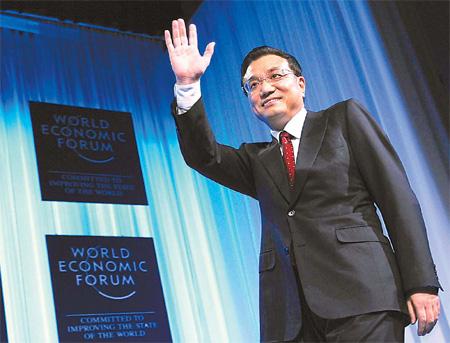
Vice-Premier Li Keqiang reaches the podium to deliver his speech on the second day of the World Economic Forum annual meeting in Davos yesterday.
'Excessively reliant on investment and exports'
Vice-Premier Li Keqiang said last night that China will seek to boost domestic consumption to drive forward its booming economy, acknowledging that export growth alone was unsustainable for development.
Li, speaking at the World Economic Forum annual meeting in Davos, said China would look to increase employment and income levels of its poorer people, hoping to unleash the huge potential of the Chinese consumer.
He also said the government would break monopolies and encourage competition while integrating more deeply into the global economy.
China recently surpassed Germany as the world's top exporter, but Li noted that economic strategies have been "excessively reliant on investment and exports".
China has emerged as one of the key countries of interest at the Davos forum with its economy set to overtake Japan's as the second-largest this year, and as the voice of the developing world.
However, its increasing clout has also led to conjecture on whether it could play a role that lives up to global expectations.
As Kristin Forbes, a former member of the White House Council of Economic Advisers, said: "China is the West's greatest hope and greatest fear."
Amid the hope-and-fear scenario, China should not overreach itself while actively participating in global coordination to solve the world's problems, Chinese analysts said.
Discussions of China's role amid and after the global financial crisis have been heated in mainstream Western medias, especially during the forum. More than 2,500 leaders from over 90 countries, representing business, government and social sectors are attending the event.
The West expects Beijing to be more engaged in global affairs but also anticipates increasing trade friction with the world's largest exporter.
"As it grows, China should do more in solving the world's problems, but only according to its capabilities," said Wang Dong, a researcher with Peking University's School of International Studies.
China has made consistent efforts in helping the world out of the financial crisis, among other initiatives. It has, for example, signed agreements with many neighboring economies on currency swaps to help regional financial stability.
Its economy expanded by an impressive 8.7 percent year-on-year in 2009, contributing to about half of the world's total economic growth.
Although it remains a developing country, expectations are high that it could do more to help the world, Wang said.
The mismatch partly comes from lack of understanding of China's real situation, said Yang Mian, researcher at Communication University of China.
"Many foreigners come to China but they mainly visit mega cities, such as Beijing and Shanghai, where living standards are quite high," he said.
"But China is a country with very uneven development. In the countryside, for example, people in many places are far less affluent than those in Beijing or Shanghai and many are stuck in poverty.
"We should not become complacent with commendations from overseas as GDP keeps expanding."
The country's per capita GDP remains low, ranking 106th in the world in 2008, ahead of Iraq but behind Armenia, according to the International Monetary Fund. China also faces such problems as an inadequate social security network and poverty.
"China must learn to explain to the world what it really is," said Chen Gong, chairman of Beijing-based Anbound Consulting.
AP contributed to the story





